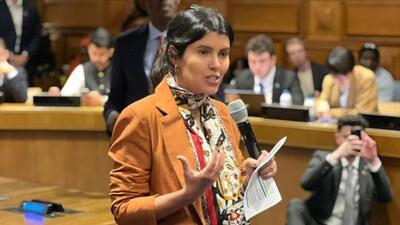
Unpacking the EU’s Green Initiatives
ITC’s webinar series on the European Union’s green initiatives seeks to build awareness and promote dialogue which allows developing countries to leverage economic opportunities in green and sustainable trade.
Transitioning to the green economy is inevitable; however, developing countries are challenged by trade-offs arising from significant investment, which could instead be directed to other developmental needs.
In fact, developing countries are first in line to be impacted by the harmful forces of climate change and environmental degradation. Moreover, consumer markets are increasingly demanding sustainable products, which opens new market opportunities. Therefore, there is a double imperative for businesses to engage in sustainable trade and transitioning to a green economy, capitalizing on market trends through economic diversification and ensuring viability of economic activities.
Shedding light on the EU’s Green Initiatives for better market access
The International Trade Centre’s (ITC) recent webinar on ‘Unpacking the EU’s Green Initiatives’ looked at the various EU regulatory initiatives underway and demonstrated the relevance for developing countries to keep track of these developments and their impact on accessing the EU market.
In recent years, the EU has rolled out several “green” initiatives leading to significant legislative and regulatory activity, including: the Green Deal with directives on Single-Use Plastics; the Farm to Fork Strategy (F2F) with action on animal welfare and food labelling; and the Fit for 55 Package consisting of interconnected proposals on climate and energy, including the Carbon Border Adjustment Mechanism (CBAM), Proposals on Sustainable Products Regulation (Ecodesign), and Corporate Sustainability Due Diligence.
These on-going and upcoming initiatives have significant trade implications, especially on developing countries and small businesses. They set forth specific market access requirements, which must be considered when developing trade strategies to leverage trade agreements and tools that give economic incentives for a business’ green transition. It is thus important for policymakers and private-sector operators to proactively adapt and comply to secure comparative advantages and continued access to EU markets.
Through this webinar, ITC sought to help the participants conceptualize the operations and potential trade impacts of each of these regulatory initiatives – and explain why governments and the private sector in developing countries should follow a systematic approach to manage legislative and regulatory initiatives.
Key areas of action for stakeholders
For more details on the webinar’s discussion, please refer to the following materials:
ITC support in a green transition
ITC provides technical assistance for stakeholders in the public and private sector across these action areas – including through targeted support for policymakers, trade negotiators, private-sector associations/chambers and individual firms. Through this support, they keep up to date on evolving trends, strengthen their understanding of the implications of green trade regulations, develop negotiating capacity, and align domestic policy and regulatory frameworks to comply with requirements.
Compliance with standards and quality requirements is a particularly challenging aspect for developing countries and small businesses. ITC provides dedicated support to capacitate standards and conformity assessment bodies to develop certification and accreditation capabilities; and for firms, including small and medium-sized enterprises, to implement sustainability standards, as well as meet compliance and certification requirements.
In addition, ITC works directly with the private sector to advocate for and facilitate policy reforms to create a more conducive business environment for green and sustainable trade.
The next webinar is scheduled to take place on 19 May 2022, focusing on the EU’s carbon policies, and the efforts required to strengthen carbon competitiveness of small businesses.
Click here for more details of this webinar and register.

















